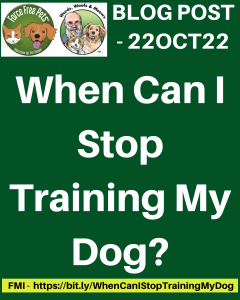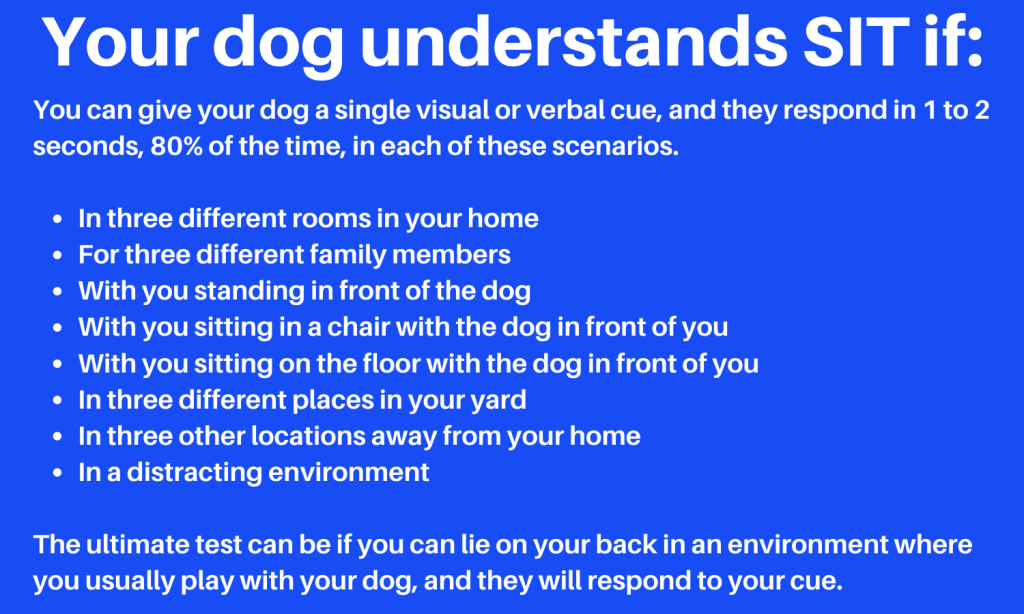When Can I Stop Training My Dog?
By Don Hanson, PCBC-A, BFRAP
 < A version of this article was published in Pets and Their People on June 28, 2022 >
< A version of this article was published in Pets and Their People on June 28, 2022 >
< A version of this article was published in the October 2022 issue of Downeast Dog News>
< Updated 22OCT22 >
< A short link for this page – https://bit.ly/WhenCanIStopTrainingMyDog >
My students often ask when they can stop training their dogs. That’s when I ask them when do you anticipate you will stop learning. My point is that we are still learning as long as we are alive. The same is true of our dogs.
If our dog is awake, they learn from us and the environment in which they live. Since the environment is vast and almost always available to our dogs, it provides more learning opportunities than we do. For example, a child in a high chair or an elderly parent at the dining room table can teach your dog by accidentally or intentionally dropping tidbits of food while eating. In this case, your dog may be learning something you would rather they hadn’t.
Understand that your dog may also learn from dogs and people it interacts with at the dog park or doggie daycare. Even the wind blowing through your apple tree at the end of summer, causing fruit to drop, could be teaching your dog. Considering your dog is always learning, I believe there are many excellent reasons to continue training them.
Reasons to Continue Training Your Dog
We all need a refresher now and then if we expect to maintain our skills. While I had two years of German back in high school, I have not used that knowledge and skill for years, and as a result, ich kann kein Deutsch mehr (I can no longer speak German.). If we stop asking our dogs to do what we have taught them, they may get rusty and not respond as well as we would like. Muppy and I practice behaviors like sit, leave it, and recall regularly. Having a reliable leave it and recall can save your dog’s life.
However, I also practice training for my benefit. Training is a mechanical skill; like all skills, it requires maintenance, just like a golf swing. The only difference between a clicker and treats and a golf club and ball is the furry friend I’m interacting with is sentient, whereas the golf ball is not.
However, a second and even more important reason to continue training your dog is that it is a great way to provide you both with mental stimulation. When  done right, training will be fun and will make your bond even stronger. That doesn’t mean you must be enrolled in a dog training class. A well-designed dog training program will leave you with the skills and knowledge you need to continue working with your dog long after completing the class; however, if you attend a class so that you can both learn something new, why not! For example, Muppy and I recently attended a new class ForceFreePets is offering called The Joy of Sniffing. We had a blast! We both learned new skills, but, more importantly, we had fun doing something together. We’re using what we learned several times per week
done right, training will be fun and will make your bond even stronger. That doesn’t mean you must be enrolled in a dog training class. A well-designed dog training program will leave you with the skills and knowledge you need to continue working with your dog long after completing the class; however, if you attend a class so that you can both learn something new, why not! For example, Muppy and I recently attended a new class ForceFreePets is offering called The Joy of Sniffing. We had a blast! We both learned new skills, but, more importantly, we had fun doing something together. We’re using what we learned several times per week
Remember, training does not need to be limited to things like sit and recall. You can teach your dog silly tricks or teach them to use their nose while playing fun scent games like find it. You will soon forget you’re learning when you and your dog have fun together. The best teachers I have had in my life were able to make learning fun.
My point is that minimally, we at least need to acknowledge that our dog will be learning their entire life. So why not use that zest for knowledge by turning it into an opportunity to continue nourishing our bond with our dog while having fun?
Determining If Your Dog Understands SIT
Students often ask, how can I tell if my dog understands what I’m teaching them? How we assess a dog’s training can vary with what we’re teaching, the environment where we are testing them, and the dog and their physical and emotional status at that particular point in time. Below you will find one method you can use to assess how well your dog understands a simple behavior like sit.
In each scenario, you will give your dog a single visual or verbal cue and look for them to respond in 1 to 2 seconds, eight times out of 10.
- In three different rooms in your home
- For three family members
- With you standing in front of the dog
- With you sitting in a chair with the dog in front of you
- With you sitting on the floor with the dog in front of you
- In three different places in your yard
- In three other locations away from your home
- In a distracting environment
The ultimate test can be if you can lie on your back in an environment where you usually play with your dog, and they will respond to your cue.
Recommended Resources
Articles on Don’s Blog
( http://www.words-woofs-meows.com )
What Is Dog Training? – http://bit.ly/WhatIsDogTraining
What to Look for When Choosing a Dog Trainer – https://bit.ly/DogTrainerChoosing
Do I Need a Dog Trainer or a “Behaviorist”? – http://bit.ly/WWM-Trainer-Behaviorist
What Is A Pet Behavior Consultant? – http://bit.ly/WhatIsPetBhxConsulting
Help! My Dog Is Stubborn! – https://bit.ly/HelpStubborn
There Are No “Stubborn” Dogs – Twelve Steps to Becoming Best Friends for Life – https://bit.ly/12Steps-BestFriendsForLife
Dog Training – A Rescue Dogs Perspective – http://bit.ly/Rescue-Muppy
Reward Based Training versus Aversives – http://bit.ly/RewardVSAversive
What Is Clicker Training? – http://bit.ly/WhatIsClickerTraining
About Don Hanson – https://blog.greenacreskennel.com/about-the-author-don-hanson/
________________________________________________________________________
Don Hanson lives in Bangor, Maine, where he is the co-owner of the Green Acres Kennel Shop ( greenacreskennel.com ) and the founder of ForceFreePets.com, an  online educational resource for people with dogs and cats. He is a Professional Canine Behavior Consultant (PCBC-A) accredited by the Pet Professional Accreditation Board (PPAB) and a Bach Foundation Registered Animal Practitioner (BFRAP). Don is a member of the Pet Professional Guild (PPG), serving on the Board of Directors and Steering Committee and chairing the Advocacy Division. He is also a founding director of Pet Advocacy International (PIAI). In addition, Don produces and co-hosts The Woof Meow Show podcast, available at http://bit.ly/WfMwPodcasts/, the Apple Podcast app, and Don’s blog: www.words-woofs-meows.com. The opinions in this article are those of Don Hanson.
online educational resource for people with dogs and cats. He is a Professional Canine Behavior Consultant (PCBC-A) accredited by the Pet Professional Accreditation Board (PPAB) and a Bach Foundation Registered Animal Practitioner (BFRAP). Don is a member of the Pet Professional Guild (PPG), serving on the Board of Directors and Steering Committee and chairing the Advocacy Division. He is also a founding director of Pet Advocacy International (PIAI). In addition, Don produces and co-hosts The Woof Meow Show podcast, available at http://bit.ly/WfMwPodcasts/, the Apple Podcast app, and Don’s blog: www.words-woofs-meows.com. The opinions in this article are those of Don Hanson.
©22OCT22, Donald J. Hanson, All Rights Reserved
< Click for Copyright and Use Policy >
